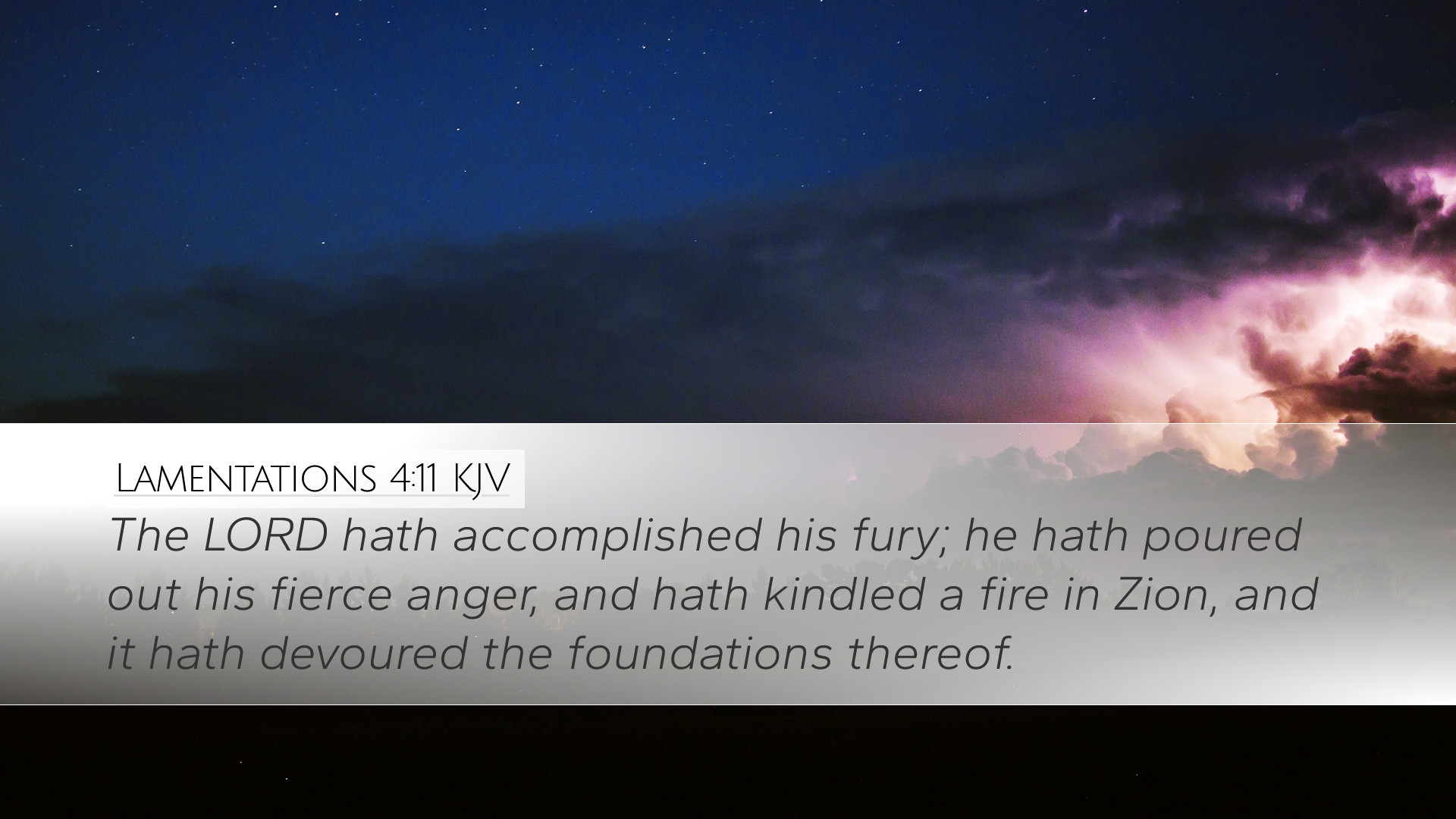Lamentations 4:11 Commentary
Bible Verse: "The LORD hath accomplished his fury; he hath poured out his fierce anger, and hath kindled a fire in Zion, which hath devoured the foundations thereof."
Overview
The verse from Lamentations 4:11 serves as a poignant testament to the consequences of sin and rebellion against God. The prophet Jeremiah laments the devastation that has befallen Zion, a representation of God's people and His dwelling place. The imagery employed reveals the intensity of God’s judgment as well as the profound sorrow and desolation experienced by the Jewish people. This verse encapsulates key themes of divine anger, destruction, and the necessity of repentance.
Commentary Insights
Matthew Henry's Commentary
Matthew Henry emphasizes the fulfillment of God’s anger against Israel, highlighting the certainty and severity of divine judgment. He notes:
- Divine Fury: The "fury" mentioned is God's righteous indignation against sin. Israel's persistent idolatry and rebellious nature provoked God to act in judgment.
- Poured Out Anger: The metaphor of pouring out suggests an unrestrained outburst of wrath, indicative of a breaking point reached due to persistent sin. This divine anger is not arbitrary but results from Israel's infidelity.
- Fire in Zion: The imagery of fire consuming Zion symbolizes complete destruction. It embodies both literal devastation (as seen in the historical context of Jerusalem's fall) and spiritual desolation—God's presence withdrawn due to sin.
- Foundations Devoured: The reference to foundations signifies the total collapse of what was once stable in Israel’s society and covenant relationship with God. The foundation of their faith and identity crumbles under the weight of judgment.
Albert Barnes' Commentary
Albert Barnes provides a thorough exegesis of Lamentations 4:11, drawing out implications for understanding God's nature and the seriousness of covenant disobedience:
- Judgment as Fulfillment: Barnes articulates that God's anger is not random but a direct fulfillment of His promises to bless obedience and curse disobedience. This reflects the covenant relationship God maintains with His people.
- Nature of God's Anger: He underscores that God's anger, while fierce, is also tempered by His justice. The pain experienced by Israel served to expose their transgressions and draw them back to repentance.
- Fire Symbolism: Barnes explains that the fires in Zion were literal—the destruction of the city—and metaphorical, representing the judgment that devoured the spiritual life of the nation.
- Destruction of Foundations: The idea of foundations being devoured resonates with believers today regarding the importance of maintaining a strong spiritual foundation through faithfulness and adherence to God's commandments.
Adam Clarke's Commentary
Adam Clarke provides a pastoral lens in reflecting on the anguish expressed in this verse, emphasizing the emotional and spiritual weight endured by the people of Jerusalem:
- Completion of Judgment: Clarke points out that the phrase “hath accomplished his fury” implies that God had reached a culmination point with His anger. This signals a sobering truth that there is a definitive limit to divine mercy when one persistently defies Him.
- Kindling of Fire: The fire kindled in Zion signifies the consuming nature of sin and rebellion against God. Clarke stresses that this fire does not merely destroy but acts as a purifier, removing the defilement that had taken root in the people.
- Foundational Disruption: He observes that when the foundations are devoured, it causes a great shake in the community's structure and faith. For pastors and scholars, this brings to light the necessity of teaching sound doctrine and instilling the necessity of root faith in God's word.
- Call to Reflection: Clarke urges contemporary readers to reflect on how sin can lead to a similar fate, emphasizing the importance of vigilance, repentance, and the cultivation of a healthy relationship with God.
Theological Takeaways
As we reflect on Lamentations 4:11, several theological implications arise that are particularly relevant for pastors, students, theologians, and scholars:
- Divine Judgment: God's judgment is an essential aspect of His holiness. Understanding this can help leaders guide congregations toward a deeper fear of God and reverence for His commands.
- Consequences of Sin: Sin is not merely a personal failing; it affects the community and the nation. This truth calls for a collective responsibility in the church to address sin among believers.
- God’s Faithfulness: Despite the severity of judgment, God’s ultimate desire is restoration. This discussion invites reflections on grace, repentance, and the hope for renewal following judgment.
- Spiritual Foundations: The “foundations” of our faith must be built on truth and integrity. This verse serves as a cautionary tale reminding us to reinforce our spiritual lives through prayer, scripture study, and accountability.
Conclusion
Lamentations 4:11 serves as both a sobering reminder of God’s righteous judgment and a call to faithfulness for His people. By studying the insights of Matthew Henry, Albert Barnes, and Adam Clarke, believers can deepen their understanding of God’s character and the serious consequences of straying from His path. Whether through communal teaching or personal reflection, this verse invites an acknowledgment of sin, a recognition of the need for repentance, and a hope for restoration that comes from God’s enduring mercy.


